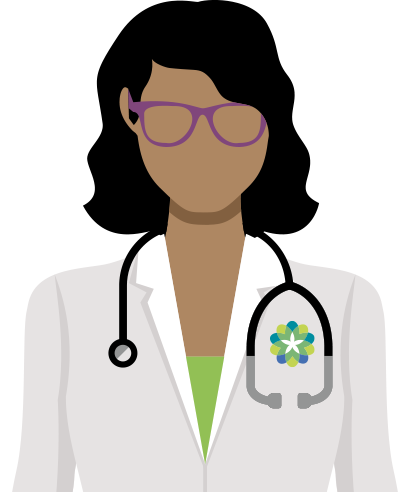|
Gene Editing Institute scientists travel to North Carolina to teach workshops and bring CRISPR gene editing to high school students from diverse backgrounds
(WILMINGTON, Del. – November 10, 2022)
Scientist-educators from ChristianaCare’s Gene Editing Institute held a workshop using CRISPR in a BoxTM at Salem Academy during Innovation Days in October at the school, located in Winston-Salem, North Carolina. These sessions followed a previous gene editing education workshop with Salem Academy students in January 2022.
 Downloadable Assets Downloadable Assets
CRISPR in a BoxTM is a revolutionary toolkit that allows students to carry out a hands-on gene editing experiment while learning and analyzing the steps involved in a typical gene editing reaction. Scientists from the Gene Editing Institute also taught a condensed lesson about CRISPR gene editing’s utility in medicine and fielded questions from students about jobs in biotechnology, bioethics and sustainability in the lab.
“It’s a really special opportunity that I know I wouldn’t get anywhere else,” said Mathilda Willenborg, a sophomore boarding student from Germany. “And I do feel like I’m learning a lot about gene editing that I definitely didn’t know before. The team makes it really easy and walks us through all the steps.”
Last winter, Salem Academy became the first school in North Carolina to offer CRISPR in a Box as it pivoted its academic focus to STEAM (Science, Technology, Engineering, Art and Math). That first innovative workshop originated as a result of an idea from a ChristianaCare board member who attended Salem Academy.
Gene Editing Institute Founder and Lead Scientist Eric Kmiec, Ph.D., made a virtual appearance as part of the latest sessions to encourage the students to pursue careers and pathways in biotechnology.
“We’re so appreciative of our partnership with Salem Academy,” said Kmiec. “We want to take every chance we get to encourage more women to pursue careers in STEM. Women around the nation, and around the world, should have access to this groundbreaking technology, which will ultimately drastically change the way we treat and cure diseases. If we don’t have young women in that discussion, we’re missing out on valuable experiences and perspectives.”
Salem Academy is the only all-female boarding and day high school on a college campus in the U.S. with a STEM focus. Women are achieving significant progress in STEM fields, representing 45% of students majoring in STEM, according to the Integrated Postsecondary Education Data System. However, women only represent 27% of STEM workers, with wide disparities in income in post-graduation employment. As of 2019, less than 30% of the world’s researchers were women, according to the UNESCO Institute for Statistics. The Gene Editing Institute commits to a mission of diversity and equity in its approach. This workshop reached 10 women, two of whom are international students.
“Our ongoing partnership with the ChristianaCare Gene Editing Institute will help position our aspiring women scientists for future careers in biotechnology, science and medicine,” said Summer McGee, Ph.D., president of Salem Academy and College. “This is the type of experience that sets Salem Academy apart as a national leader in building the next generation of women leaders in STEAM.”
The Gene Editing Institute itself is a national leader in female researchers. Women make up over 80% of scientists within the Institute and fill 75% of the principal investigator roles. The Institute pushes to address the gender gap and promote inclusivity through local outreach and state-spanning programs, like CRISPR in a Box.
“We’re not here to do lip service,” said Brett Sansbury, Ph.D., principal investigator of the Discovery Branch of the Gene Editing Institute. “Too many companies make a plan or promise without any actionable steps. We’re taking those steps and bringing in opportunities for students who otherwise wouldn’t have had them.”
To learn more about how to bring CRISPR in a Box to your school, visit https://geneeditinginstitute.com/products/education.
About CRISPR in a BoxTM
CRISPR in a BoxTM is the leading educational toolkit to teach gene editing. The exercise features a hands-on gene editing experiment, including a live readout within non-infectious E. coli bacteria. These experiments follow a gene editing reaction from beginning to end while teaching students the techniques scientists use to perform these reactions in real laboratory environments. CRISPR in a Box is distributed by Carolina Biological. To learn more, visit https://geneeditinginstitute.com/products/education.
 |
|
Need an expert source?
Our Experts, ChristianaCare's expert database, can help you find the right source for your next news story.
Request an interview ➜ |
|
About the ChristianaCare Gene Editing Institute
The Gene Editing Institute, a wholly owned subsidiary of ChristianaCare, is a worldwide leader in CRISPR gene editing technology and the only institute of its kind based within a community health care system. The Gene Editing Institute takes a patient-first approach in its research to improve the lives of people with cancer and inherited diseases. Its education and outreach team are preparing the next generation of gene editing scientists through its on-site Learning Lab and immersive CRISPR in A Box™ teaching toolkit. Since 2015, researchers at the Gene Editing Institute have been involved in several ground-breaking firsts in the field that will help bring treatments to patients quickly and safely. Its researchers are currently investigating how best to use CRISPR-directed gene editing to overcome cancer drug resistance that develops in virtually all solid tumors and establish a “plug-and-play” model to treat lung and other cancers. The Gene Editing Institute, working with its spin out company CorriXR Therapeutics, will seek approval from the FDA to start clinical trials in humans in 2025.
####
|